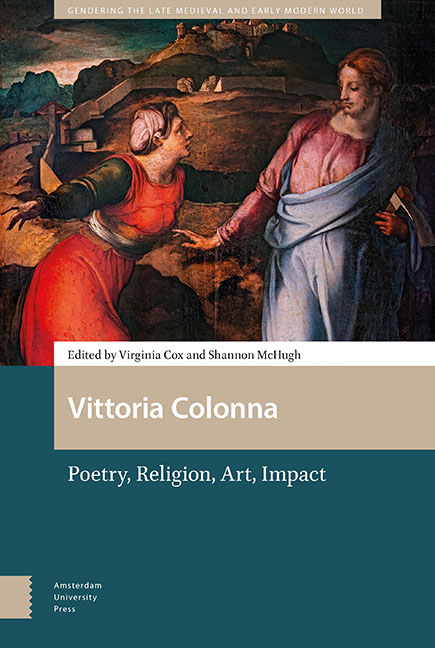Book contents
- Frontmatter
- Dedication
- Contents
- List of Illustrations
- Acknowledgements
- Introduction: The Twenty-First Century Vittoria Colonna
- Part 1 Literary and Spiritual Sociability
- Part 2 Widowhood
- Part 3 Poetry
- Part 4 Art
- Part 5 Readership
- Part 6 Impact
- Volume Bibliography
- Index of Citations of Colonna’s Letters and Verse
- Thematic Index
13 - Colonna and Petrarch in the Rime of Lucia Colao
Published online by Cambridge University Press: 16 December 2021
- Frontmatter
- Dedication
- Contents
- List of Illustrations
- Acknowledgements
- Introduction: The Twenty-First Century Vittoria Colonna
- Part 1 Literary and Spiritual Sociability
- Part 2 Widowhood
- Part 3 Poetry
- Part 4 Art
- Part 5 Readership
- Part 6 Impact
- Volume Bibliography
- Index of Citations of Colonna’s Letters and Verse
- Thematic Index
Summary
Abstract
The lyric production of the Friulian writer Lucia Colao (b. 1578), which survives in two manuscripts, represents a rare female contribution to the tradition of religious rewritings of Petrarch, which began in the 1530s with Girolamo Malipiero's Petrarca spirituale. Colao recasts in a spiritual form 121 Petrarchan lyrics, all from the first part of the RVF. This chapter analyzes the complexities of the relationship between hypotext and hypertext in Colao's reworkings, and the dialectic between conservation, substitution and resemantization of the lexis and content of the originals. It also considers how Colao's texts construct a feminine subject within lyric discourse, in a manner that reflects the lessons of Vittoria Colonna's earlier creative appropriation of Petrarch in her spiritual lyrics.
Keywords: literary adaptations and appropriations, religious poetry, devotional literature, lyric poetry books, manuscript and printing
A little-known episode in the history of the sixteenth-century reception of the Italian classics concerns their religious ‘conversion’, a curious case of productive reception (to use the terminology of Klaus W. Hempfer), which involves works both by authors canonized within the critical debate of the period (Petrarch, Boccaccio, Tasso), and by authors legitimized through their immense publishing success (Ariosto). This process of spiritual rewriting can be as minimal as repurposed citation, or it can extend as far as a complete transfer of structure, concepts and forms from one cultural code to another. The reception of Petrarch's Rerum vulgarium fragmenta offers a precocious and highly articulated example of this phenomenon, spanning both the ideologically inflected theorizing and formal codification we see in Girolamo Malipiero's Petrarcha spirituale (1536), and the militant rewriting of Giovan Giacomo Salvatorino's Thesoro di sacra scrittura sopra le rime di Petrarcha (1539), as well as the ventriloquized, female-voiced fragmenta we find in the Risposte di m[adonna] Laura a m[esser] Francesco Petrarcha, attributed to Stefano Colonna (1552).
Within this general context, I intend to concentrate my attention on the lyric production of the Friulian writer Lucia Colao, who, in my view, gives interesting evidence of the persistence of Vittoria Colonna's fortunes within the post-Tridentine period, as well as attesting to the role that Colonna's religious lyrics had assumed as a legitimizing stylistic and thematic model for female poets. We have very few biographical details for Colao.
- Type
- Chapter
- Information
- Vittoria ColonnaPoetry, Religion, Art, Impact, pp. 309 - 330Publisher: Amsterdam University PressPrint publication year: 2021

